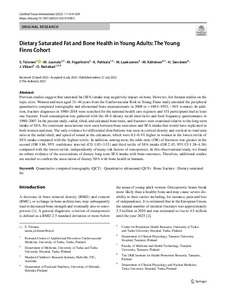Dietary Saturated Fat and Bone Health in Young Adults : The Young Finns Cohort
Tolonen, S.; Juonala, M.; Fogelholm, M.; Pahkala, K.; Laaksonen, M.; Kähönen, M.; Sievänen, H.; Viikari, J.; Raitakari, O. (2022-07)
Tolonen, S.
Juonala, M.
Fogelholm, M.
Pahkala, K.
Laaksonen, M.
Kähönen, M.
Sievänen, H.
Viikari, J.
Raitakari, O.
07 / 2022
Julkaisun pysyvä osoite on
https://urn.fi/URN:NBN:fi:tuni-202210057427
https://urn.fi/URN:NBN:fi:tuni-202210057427
Kuvaus
Peer reviewed
Tiivistelmä
Previous studies suggest that saturated fat (SFA) intake may negatively impact on bone. However, few human studies on the topic exist. Women and men aged 31–46 years from the Cardiovascular Risk in Young Finns study attended the peripheral quantitative computed tomography and ultrasound bone measurements in 2008 (n = 1884–1953, ~ 56% women). In addition, fracture diagnoses in 1980–2018 were searched for the national health care registers and 431 participants had at least one fracture. Food consumption was gathered with the 48-h dietary recall interviews and food frequency questionnaire in 1980–2007. In the present study, radial, tibial, and calcaneal bone traits, and fractures were examined relative to the long-term intake of SFA. No consistent associations were seen between bone outcomes and SFA intake that would have replicated in both women and men. The only evidence for differential distributions was seen in cortical density and cortical-to-total area ratio at the radial shaft, and speed of sound at the calcaneus, which were 0.1–0.4% higher in women in the lowest tertile of SFA intake compared with the highest tertile. In addition, among men, the odds ratio (OR) of fractures was greater in the second (OR 1.86, 95% confidence interval (CI) 1.03–3.33) and third tertile of SFA intake (OR 2.45, 95% CI 1.38–4.36) compared with the lowest tertile, independently of many risk factors of osteoporosis. In this observational study, we found no robust evidence of the associations of dietary long-term SFA intake with bone outcomes. Therefore, additional studies are needed to confirm the association of dietary SFA with bone health in humans.
Kokoelmat
- TUNICRIS-julkaisut [16977]
